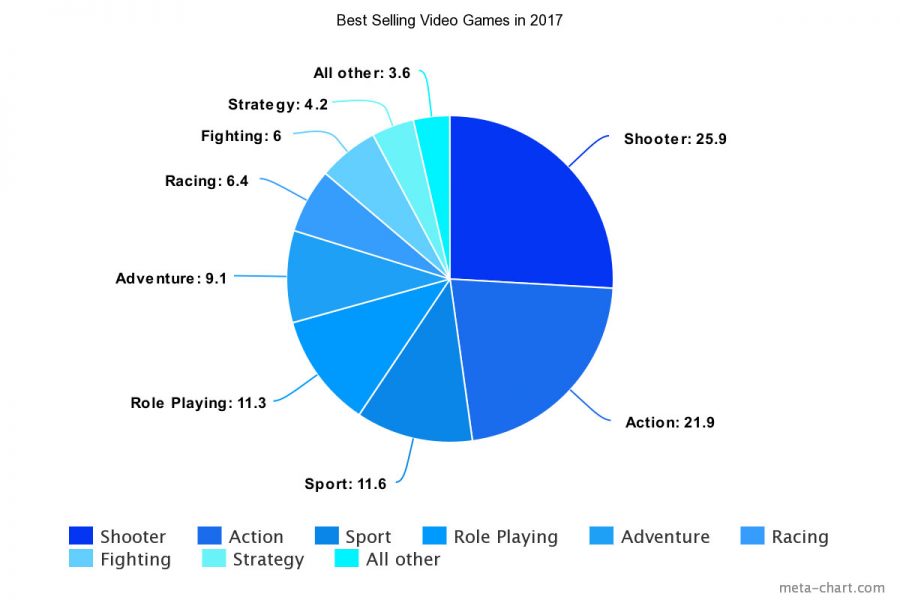Violence in video games; a culture of desensitization?

More stories from Kinsley Wilcox-McBride
Statistics about the sales popularity of different types of video games in 2017. Shooter games were a large majority, with action at a close second. Sophomore Milo Miles prefers to play shooter games to other genres. “There’s always something you can do to improve,” he said.
The desensitization to violence in society can show in many ways. It can seem like society has blown off the upsetting nature of violence for a form of profitable entertainment. Violent video games, movies, and popularity of fights are all examples.
Video games are very popular, with fans across all ages. The foundation of most popular games are often violent in nature, with killing being the main objective. The question of why people enjoy virtual combat, even knowing that real combat can be traumatic, may be a complicated one. According to a study published in the science journal Nature, it is human nature.
To break it down to basics, people think it’s intriguing. Psychology researchers have found that it is inherently human to be drawn to intense psychological experiences. We see this in the popularity of horror, torture, and psychological thriller movies.
In situations where you are seeing violence take place, people are put in a unique mental place. They often will see themselves in a position portrayed on screen which they have not been in, and may struggle to comprehend.
“Games and movies keep getting more realistic,” said sophomore Milo Miles, who stated that while he does not personally feel a desensitization to violence, he feels that it is becoming an issue in society.
However, sophomore Theodore Wilson felt that certain elements of realism can be a good thing. He said that “things that are addressed in video games are actually things that go on in the world, they’re often inspired by real events.” Wilson made the point that for him, this helped shape a more empathetic view of real life violence.
An article by the Chicago Tribune explains the subconscious thought processes people can have while engaging with violent content. Would you rather be a victim, or in a position of power? Questions like these play with morality and values in a person.
Given the interactive nature of video games, players can act out such scenarios rather than grapple with them internally; adding a new layer graphic movies cannot give.
However Miles says that even as a regular gamer, when it comes to violence in real life he sees it “as a much bigger thing. When I’m playing a violent video game, I know what I am doing is fake.” Miles feels this is an important distinction to make. “I can tell the difference between real violence and fake violence.”
There have been many studies on human psychology and why we are drawn to morbid things. A study by the journal Psychopharmacology found that in mice, “the same clusters of brain cells involved in other rewards are also behind the craving for violence.”
They found that the reward pathway is engaged during violent events like it is in positive experiences. “When I do something good in a shooter game, I obviously feel happy,” agreed Miles.
Speaking on desensitization, Miles said that “that’s just the problem with people who play games 24/7. People who spend their entire life [gaming], they could start seeing the real world as a game and I think that makes it a little… too much,” continued Miles. “I try to see them as completely different things.”
For Wilson, video games do not feel like a psychological experience. For him, they are an effective escape from reality that can help with relaxing after a long day. “It’s fun that you can create or do things that in reality you might not have the ability to do.”
Wilson felt it was important to make the point that “for movies and video games, I feel like there’s such thing as too much [gore]. I like games that even when they’re violent, have a plot. I like when they talk about a topic that interests me or that matters to me.”
For Miles, the fact that “you can always get to a higher level, there’s no bar where once you get to a certain part in the game, you can’t get any better,” is appealing. “There’s always something you can do to improve your skill and I like that about most first person shooter games,” he said.
There is also much more to video games than the action or violence your character is taking part in. “I think it’s about, violent or not, accomplishing things, achieving what you’re striving for,” said Wilson.
“I don’t think it’s about the game you play, I think it’s about what you take out of it,” said Wilson. This is an important point to be made, as not all video games are that serious. Different people gather different things from situations, and it feels nice to be able to acknowledge the more lighthearted appeals of entertainment.

Kinsley Wilcox McBride is a senior at South now in her fourth year of newspaper. She served as Features editor last year and is excited to be editor in...

Katherine Lundquist is the Editor in Chief of our student run newspaper, and has been on the team since freshman year. Lundquist is invested in nature,...


